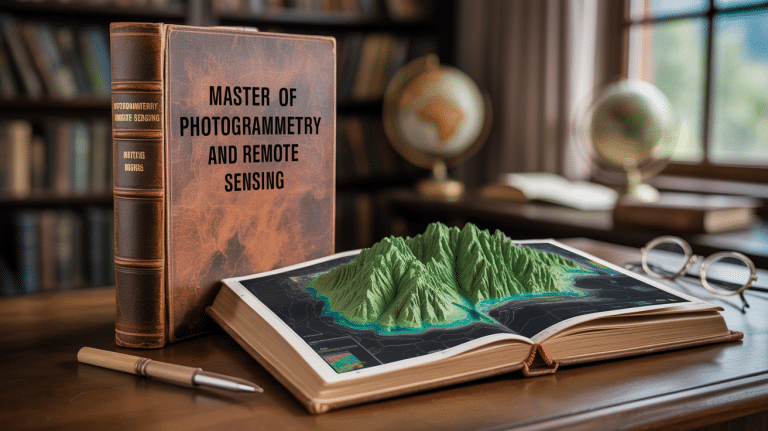Master of Photogrammetry and Remote Sensing: A Comprehensive Guide
What is a Master of Photogrammetry and Remote Sensing?
A Master of Photogrammetry and Remote Sensing is an advanced academic program that equips students with the necessary theoretical knowledge and practical skills in photogrammetry, remote sensing technologies, and geoinformation science. The degree focuses on the scientific principles and application of data collection techniques, which are essential for managing geographical information in various professional contexts.
This multidisciplinary program often incorporates elements from fields such as geography, surveying, environmental science, and computer science. Through this education, graduates are prepared for numerous roles in research, policy-making, and technical projects where spatial data is crucial.
What Do You Study in Master of Photogrammetry and Remote Sensing?
Core Subjects
- Photogrammetry
- Fundamentals: Students explore the history of photogrammetry and its applications.
- Technical Methods: Coursework delves into project planning, photo scales, camera types, and accuracy analysis.
- Data Processing: Students learn about aerial triangulation and theoretical models for 3D reconstruction from images.
- Special Techniques: Study of orthophotos, ortho-mosaicing, geometric adjustments, and radiometric corrections.
- Remote Sensing
- Principles of Remote Sensing: The program emphasizes the types of sensors, including passive and active sensors, and how they operate.
- Data Analysis: Students learn to process and analyze remotely sensed data, focusing on classification methods and atmospheric corrections.
- Applications: Exploration of applications in environmental studies and resource management using tools such as LiDAR and satellite imagery.
- Geoinformatics
- GIS Integration: The integration of photogrammetric and remote sensing data into GIS platforms.
- Environmental Applications: Students learn how to apply GIS in urban planning, land management, and environmental impact assessments.
Elective Courses and Specializations
Students may also choose electives in emerging technologies such as machine learning applications in geospatial analysis, advanced data visualization techniques, and systems for real-time data acquisition.
Labs, Workshops, and Internships
Hands-on experience is a vital component of the program. Students typically engage in lab work that involves practical training in data collection and interpretation. Workshops led by industry professionals provide further insights into current technological trends. Many programs also encourage or require internships, enabling students to apply their learned skills in real-world settings, often leading to significant networking opportunities.
Careers After Master of Photogrammetry and Remote Sensing
Graduates from this master’s program can anticipate a diverse array of career opportunities in sectors such as environmental management, urban planning, research, and technology. Career prospects include:
- Geospatial Analyst
- Remote Sensing Consultant
- Photogrammetry Project Manager
- GIS Specialist
- Environmental Monitoring Expert
- Land Surveyor
Salary Expectations
The average salaries for roles within this domain can vary significantly based on geographical location, experience level, and sector.
- Geospatial Analyst: Average Salary: $55,000 – $70,000 (USD), €50,000 – €65,000 (EUR)
- Remote Sensing Specialist: Average Salary: $60,000 – $80,000 (USD), €55,000 – €75,000 (EUR)
- Photogrammetry Project Manager: Average Salary: $75,000 – $95,000 (USD), €65,000 – €85,000 (EUR)
- GIS Technician: Average Salary: $50,000 – $65,000 (USD), €45,000 – €60,000 (EUR)
Overall, with increasing global reliance on geospatial data, the demand for qualified professionals in this field is expected to continue growing.
Is Master of Photogrammetry and Remote Sensing Hard to Study?
The complexity of this program depends largely on the student’s background; however, there are common challenges that prospective students might face:
Common Challenges:
- Technical Complexity: The integration of physics, mathematics, and geography can be rigorous.
- Practical Applications: Transitioning from theoretical learning to practical data analysis may be demanding.
- Rapidly Evolving Technology: Keeping pace with technological advancements and software updates requires continuous learning.
Required Skills:
- Strong analytical and critical thinking skills.
- Proficiency in mathematics and statistics.
- Familiarity with programming languages commonly used in GIS and remote sensing (e.g., Python, R).
- Ability to visualize data and apply geographic concepts effectively.
Preparation Tips:
- Gain familiarity with GIS software and tools prior to starting the program (e.g., ArcGIS, QGIS).
- Brush up on essential mathematics and statistics skills relevant to data analysis.
- Engage in workshops or online courses focusing on remote sensing and GIS technologies before enrolling.
Top Certifications After Master of Photogrammetry and Remote Sensing Graduation
Upon graduating from this program, students may choose to pursue various certifications that enhance their qualifications and career prospects, including:
- GIS Professional (GISP): Offered by the GIS Certification Institute, which demonstrates expertise in GIS technology and its applications.
- Remote Sensing and GIS Certificate: Many universities and professional organizations provide certification to validate specialized skills.
- Certified Photogrammetrist (CP): Administered by the American Society for Photogrammetry and Remote Sensing (ASPRS), this credential emphasizes proficiency in photogrammetry.
These certifications can be highly beneficial, offering recognition to graduates and improving employment prospects in a competitive job market.
Where to Study Master of Photogrammetry and Remote Sensing
Several universities offer specialized programs in Photogrammetry and Remote Sensing. Here are a few distinguished institutions where you can pursue this master’s degree:
When considering a university, it’s essential to explore their specific program structures, faculty expertise, and facilities to find the best fit for your career aspirations.
Take the Next Step with Study in Turkiye
If you are ready to pursue a Master of Photogrammetry and Remote Sensing, explore the available programs and find the one that suits your needs best.



